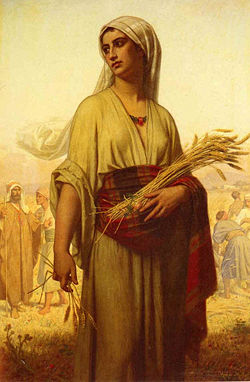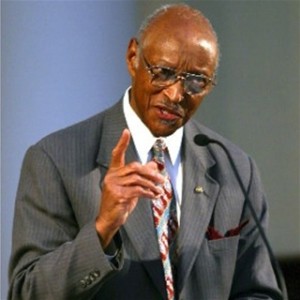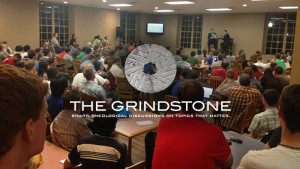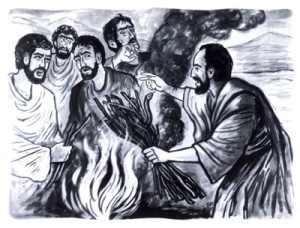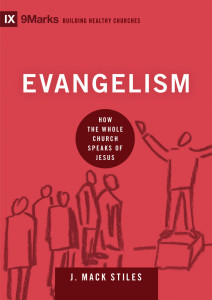17 When Pharaoh let the people go, God did not lead them by way of the land of the Philistines, although that was near. For God said, “Lest the people change their minds when they see war and return to Egypt.” 18 But God led the people around by the way of the wilderness toward the Red Sea. And the people of Israel went up out of the land of Egypt equipped for battle. 19 Moses took the bones of Joseph with him, for Joseph had made the sons of Israel solemnly swear, saying, “God will surely visit you, and you shall carry up my bones with you from here.” 20 And they moved on from Succoth and encamped at Etham, on the edge of the wilderness. 21 And the Lord went before them by day in a pillar of cloud to lead them along the way, and by night in a pillar of fire to give them light, that they might travel by day and by night. 22 The pillar of cloud by day and the pillar of fire by night did not depart from before the people.
Everybody everywhere needs encouragement, maybe especially in the Church.
I grew up, as some of you might have grown up, hearing preaching that oftentimes lacked encouragement. I do not wish to slander the good men who pastored me as a boy. I do not even claim that they failed to encourage. Perhaps it was more my perception than anything else. But, especially as a younger boy, this was certainly my perception: that the Christian life was a grueling journey in which the primary feeling I should feel is disappointment with myself and fear of the wrath of God.
I would go so far as to say that in popular Southern religion of yesteryear, this was a staple of preaching. Good preaching, the assumption seemed to be, was preaching that broke you under the weight of your own sin and the account you would one day give of yourself before God.
Do not get me wrong: I do believe we should feel the seriousness of sin and be aware of the judgment to come, but it does strike me as odd that a people committed to the good news of the gospel and the liberating power of Christ would be so morose in their walks!
No, everybody everywhere needs encouragement. The Lord demonstrated this in His dealings with His people. To be sure, the Lord disciplined and disciplines His children. He says the hard word when it is needed. He reveals the painful realities of our hearts. But He also encourages.
One beautiful example of this can be seen in His treatment of Israel as they exited Egypt and began moving toward the Red Sea. Here we see the amazing comfort and encouragement of God demonstrated in some quite powerful and unique ways. Let us consider the encouragement that God gives us, and let us claim it as our own, for our great God is unchanging in His ways.
God encourages us by often taking us through trials that are less than others He might have taken us through.
We first see how God encourages us in the way that He led the children of Israel away from an initial trial that would have been too daunting for His people at the time.
17 When Pharaoh let the people go, God did not lead them by way of the land of the Philistines, although that was near. For God said, “Lest the people change their minds when they see war and return to Egypt.” 18 But God led the people around by the way of the wilderness toward the Red Sea. And the people of Israel went up out of the land of Egypt equipped for battle.
This is most interesting. The most direct road to the promised land led straight through the land of the Philistines. Because of this, God decided to take them on the longer route. Why? Because He knew that the bloodshed the Israelites would encounter in any clash with the Philistines would cause many of them to want to return to Egypt. Douglas Stewart explains;
We know…that the Philistines were so daunting a fighting force at the time of the conquest, forty years later and beyond, that even at Joshua’s death their territory remained unconquered (cf. Josh 13:1-5). We also know that they were bold enough to attack Egypt proper in an effort to capture territory in the days of Ramses III, that is, about 1188 BC, suggesting that they considered themselves at that time – considerably after the Israelites had entered Canaan – potentially able to defeat even the Egyptians, depending on the circumstances. Accordingly, God did not want his people to try to enter Canaan directly by the well-established coastal road from Egypt, the Via Maris, even though that was by far the shortest and easiest route from the point of view of travel time and theoretical convenience. The Via Maris led right through the heart of Philistine territory.[1]
Here is one of the ways that God encourages us: He oftentimes takes us through challenges that are less than they might have been.
At this point, we should address an obvious objection: how on earth is facing the Red Sea with an Egyptian army closing fast on you less of a challenge than facing the Philistines? The answer is clear enough: the Lord God obviously felt that it was. Likely this was because of the fact that the Red Sea, though obviously a jaw dropping obstacle and challenge, was one before which God knew that none of the Israelites would actually die. Better a fright to the system leading to awestruck praise than survival of a brutal battle in which many of the Jews would have died.
So the point stands, amazing though it is: in taking the Israelites to the edge of the Red Sea instead of through the land of the Philistines God was actually taking them through a less daunting and taxing challenge. And so He often does with us. I say “often” because, obviously, God does not always take us around the most difficult challenges. Sometimes He does indeed take us right through the heart of them. “Yea, though I walk through the valley of the shadow of death…” Even so, He oftentimes does not, as in our text, and for this we should give Him praise and thanks.
This truth should lead us to do two things. First, it should lead us to appreciate the fact that the trial we are facing at any given moment, while difficult, could most likely be much worse. Stop and think the next time you find yourself in dire straits: God likely allowed this to happen by not allowing something even worse to happen. That is a dose of perspective that we sorely need.
Secondly, it should cause us to be careful with judging the length of time in which God leaves us in our trials. Remember: the Jews had to take a much longer route, but, in so doing, they avoided pain that many of them would have found too much to handle. Let us remember when we doggedly complain about how long this or that challenge or trial has been pestering us that it could just be that the price of ending it more quickly would be facing an even more brutal challenge. Do not complain about the longer road that takes you around the greater trial.
God encourages us by never forgetting a promise.
God also encourages us by never forgetting His promises to His people. Consider verse 19:
19 Moses took the bones of Joseph with him, for Joseph had made the sons of Israel solemnly swear, saying, “God will surely visit you, and you shall carry up my bones with you from here.”
As they left, Moses took the bones of Joseph. Why? Because Joseph had prophesied that they one day would carry his bones out of Egypt. We read of this in Genesis 50.
22 So Joseph remained in Egypt, he and his father’s house. Joseph lived 110 years. 23 And Joseph saw Ephraim’s children of the third generation. The children also of Machir the son of Manasseh were counted as Joseph’s own. 24 And Joseph said to his brothers, “I am about to die, but God will visit you and bring you up out of this land to the land that he swore to Abraham, to Isaac, and to Jacob.” 25 Then Joseph made the sons of Israel swear, saying, “God will surely visit you, and you shall carry up my bones from here.” 26 So Joseph died, being 110 years old. They embalmed him, and he was put in a coffin in Egypt.
It is important to notice that Joseph’s prophecy was rooted in the promise of God: “God will surely visit you.” On what basis could Joseph make such a bold assertion? On the basis of the covenants of God. God made a covenant with Abraham that He would bless him and his offspring and give them a land and a home and a name. As Joseph lay dying in Egypt, he knew that God would be true to His word. And God was! Thus, we read of God’s remembrance of His promise in Exodus 2.
23 During those many days the king of Egypt died, and the people of Israel groaned because of their slavery and cried out for help. Their cry for rescue from slavery came up to God. 24 And God heard their groaning, and God remembered his covenant with Abraham, with Isaac, and with Jacob. 25 God saw the people of Israel—and God knew.
Peter Enns rightly observes that “God delivers Israel from Egypt not because they somehow deserve it, but because he has a promise to keep to Abraham and the other patriarchs.”[2] That is true! He does indeed have a promise to keep…and He always keeps His promises.
Whatever else you might think of this beautiful fact, it should be for you a source of great encouragement. God is true to His word. He will not abandon you. He will not forsake you. He will not leave you in Egypt forever, but only for a time. He will come to you. He does love you. He has not forgotten you!
God encourages us by giving us signs of His presence in the day and in the night.
God has given His people His word, but, as we see in our text, He also gives us reminders of His presence. The signs of His presence that He gave to Israel on their exodus journey were startling indeed.
20 And they moved on from Succoth and encamped at Etham, on the edge of the wilderness. 21 And the Lord went before them by day in a pillar of cloud to lead them along the way, and by night in a pillar of fire to give them light, that they might travel by day and by night. 22 The pillar of cloud by day and the pillar of fire by night did not depart from before the people.
A pillar of cloud and a pillar of fire! God was leading His people as He manifested Himself in cloud and fire. This is one of the most well known miracles in the Bible. Of course, skeptics cannot help but propose naturalistic theories attempting to explain away the miraculous nature of the pillars. In particular, two naturalistic theories have been proposed.
First, some have proposed that the pillars of cloud and fire were the result of volcanic activity. There had been an eruption on the Island of Thera in 1628 B.C. that destroyed Minoan civilization. The effects might theoretically have still been visible. But the dates do not really work and it cannot explain the guided movement of the pillar to the southeast.
Others have proposed that the pillars were “the result of a brazier of some sort carried on a pole that would be used by the vanguard scouts.” But the pillar “is always portrayed as acting…rather than being operated,” as Walton, Matthews, and Chavalas put it in The IVP Bible Background Commentary.[3]
Such theories are enslaved to a naturalistic view of life that has no room for the miraculous. Let me simply say that trying to read the book of Exodus from a naturalistic perspective must be a very frustrating enterprise, for it is filled to the brim with miraculous displays of God’s power. The pillar of cloud and the pillar of fire is simply one of many such examples.
Why did God manifest Himself in such a visible way? Whatever other reasons we might point to, His desire to encourage His people must certainly be included. He wanted them to know that they were not alone. Douglas Stewart put it nicely when he wrote:
By reason of being guided by the pillar, the Israelites knew all day every day that God was present with them. Here was a supernatural, huge, and visible reminder that Yahweh was the head of his people as they marched or encamped, whether by day or by night…He manifested himself in the form of a pillar of cloud/fire for their benefit.[4]
Yes, it truly was for their benefit. It was God telling them that He would walk with them each step of the way.
As a boy I used to ask God on occasion to manifest Himself in a visible way to me. I recall doing this in the backyard when nobody else was around. It did not seem too much to me for God to give me just one little sign of His presence. In doing this, I was committing two errors: (1) I was testing God and (2) I was falling into the trap of thinking that visible displays were the only or even the best ways that God could show Himself to me.
As I have walked with Jesus, I have learned that God has in fact given His people numerous signs of His presence. One sign I would like to mention is the Lord’s Supper. You may have not thought of it in these terms, but the Lord’s Supper is an established, divinely sanctioned, consistently repeated visible symbol of the presence of God with His people. The elements of bread and juice both remind us of the saving work of Christ and remind us of the abiding presence of Christ with His people. They are, in a certain sense, our pillar of cloud and of fire.
And there is another visible and tangible evidence of God with us: each other. If the Church is the body of Christ that means that we have the privilege of being Christ to each other here and now. I do not mean ontologically, of course. We are never literally Christ. But when we love each other and forgive each other and help each other and encourage each other, Christ is present in the love and the forgiveness and the help and the encouragement. Would you like to see God visibly displayed? Then live the life of Christ for the person sitting next to you in the pew. Live the life of Christ and you will see it displayed in a powerful way.
God has not left the world without a witness of His existence and presence. The truth of the matter is that we oftentimes simply forget that we are the witness He has left! Would you like to see your brother or your sister encouraged by a divine sign? Then love them like Jesus loves you and lay down your life for one another. Then, God can be clearly seen in the changed lives of His people.
Church, be the encouragement you want and recognize the encouragement God gives.
[1] Douglas K. Stuart, Exodus. The New American Commentary. Vol 2. Gen. Ed., E. Ray Clendenen (Nashville, TN: B&H Publishing Group, 2006), p.322.
[2] Peter Enns, Exodus. The NIV Application Commentary (Grand Rapids, MI: Zondervan, 2000), p.27.
[3] John H. Walton, Victor H. Matthews and Mark W. Chavalas, The IVP Bible Background Commentary: Old Testament. (Downers Grove, IL: InterVarsity Press, 2000), p.89-90.
[4] Douglas K. Stuart, p.328.


